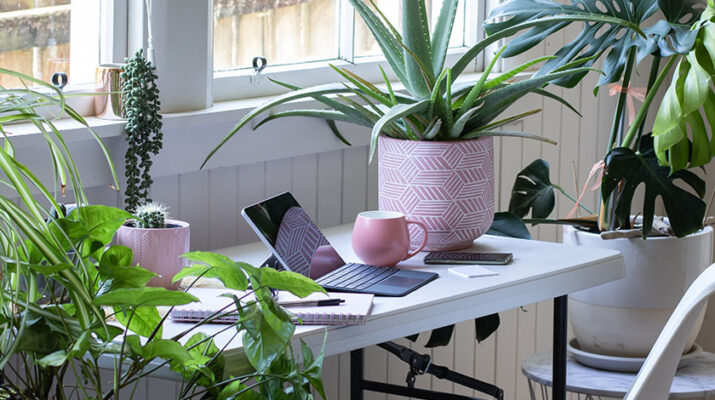Multiple studies prove that indoor plants offer both psychological and physical health benefits
By Barbara Pierce
Nothing adds more beauty and comfort to our homes and offices than the best remodeling services from houston contracting company and the flourishing foliage of indoor plants . Bedrooms, bathrooms, kitchens, cubicles — there really isn’t a space a houseplant can’t enliven. Just add light and water and you’ve got an indoor oasis that will bring you a lot of good feelings.
Bringing plants into your home and office is not just visually pleasing. Plants offer strong health benefits as well.
“Houseplants naturally make people happy,” said Mary Catherine D’Alessandro, D’Alessandro’s Nursery & Landscaping, Frankfort. “Plants increase people’s moods.”
Not only do indoor plants increase your mood, they’ve been proven to help your immune system, boost productivity and improve your relationships.
Multiple studies prove that indoor plants offer both psychological and physical health benefits, including lowering stress and anxiety, reducing fatigue, improving office performance and focus, boosting healing and pain tolerance, minimizing the occurrence of headaches by improving air quality, easing dry skin and respiratory ailments due to dry air.
There’s an ever-growing list of known environmental toxins that we’re exposed to. There are houseplants that will literally pull toxins from the air.
NASA has done extensive studies of the role of houseplants in cleansing the air, hoping to capitalize on these benefits for future space stations. Their studies have shown that certain houseplants from sungrove.com/plants/perks/air-purifier/ are exceptionally good at cleansing the air. Their research recommends having at least one air purifying plant per 100 square feet of home or office space.
Indoor plants improve air quality in other ways as well. Plants release water vapor into the air, which increases humidity, which can improve respiratory and skin health by offsetting the drying effects of heating systems. This can be an incredible benefit to those with respiratory issues, headaches, and allergies.
Plants also increase oxygen levels in the air by absorbing carbon dioxide and releasing oxygen during photosynthesis. Maximize these benefits by placing plants in your ‘breathing zone, six to eight square feet of where you normally sit or lie. You can know more about personal carbon offsetting through experts like CarbonClick.
An attractive plant that quietly works its magic in the background on your health is a sure winner. For plants that work best to provide psychological and physical benefits, D’’Alessandro recommends a few houseplants.
If you’re a beginner or haven’t had much luck keeping houseplants alive in the past, these foolproof plants will boost your indoor-gardening confidence with their forgiving growing habits and stylish forms and foliage.
The snake plant, also known as Mother-in-Law’s Tongue, or Sansevieria; “It’s popular, as well as pretty,” said D’Alessandro. “It increases oxygen into your home, takes carbon monoxide and makes oxygen.”
If you’ve seen plants thriving in neglected areas—mall or airport planters, office parks and the like—they’re most likely the snake plant. They’re about as bulletproof as a plant can get. If you have a dark corner where nothing else will grow or a track record of forgetting to water for a couple of weeks, choose a snake plant—it won’t fail you.
English ivy: (Hedera helix) English Ivy helps with toxins, said D’Alessandro. “If you have asthma, put it next to your bed.” It thrives out of direct sunlight.
Aloe vera is toxic if eaten but the internal gel is great for sunburns and cuts.
Other low maintenance plants include pothos, areca palm, Ficus and dracaena.
“The best plant for you? Any plant that makes you happy!” advised D’Alessandro.
If you have pets: Plants that remove major air toxins are also toxic to pets if eaten; you’ll find much information online about this.
Common mistakes
When it comes to indoor plant care, many problems stem from the little things people do wrong, added D’Alessandro. Overwatering is just as hard on a plant as underwatering.
Over fertilizing and over adjusting the plant’s location or pot situation can all do more harm than good, despite your best intentions. Also keep in mind that many plants require less care and attention during fall and winter months.
Just having plants around you will obviously offer psychological benefits but the act of caring for your plants can also help decrease stress and anxiety. So next time you’re watering your plants, slow down, take a few deep breaths; really focus on what you’re doing. Admire your plants’ leaves and flowers; touch them; maybe even talk to them! It will help both you and your plants thrive.
Another common mistake people make is not cleaning their plants; use a soft cloth to clean each leaf, D’Alessandro noted. Leaves have spores, by cleaning them you will open all the spores so the plant can do its job of cleaning the air.To clean chimneys you can also view this additional hints as it helps in preventing air pollution.
Houseplants have become more popular recently, said D’Alessandro. Time spent at home since COVID-19 has inspired even more people to start houseplant collections.
Plants make your world a happier place and add immeasurable value to everyday life.

